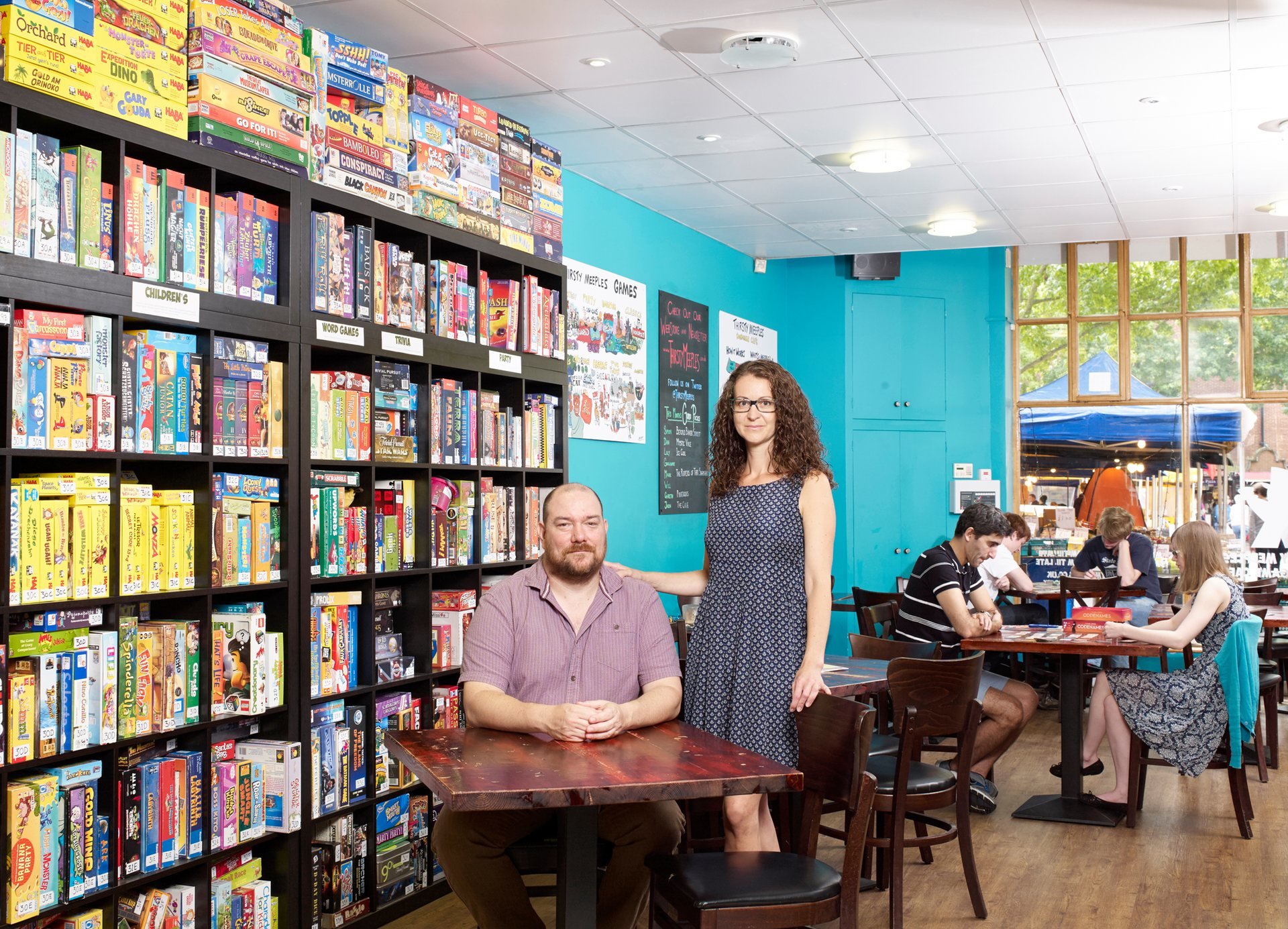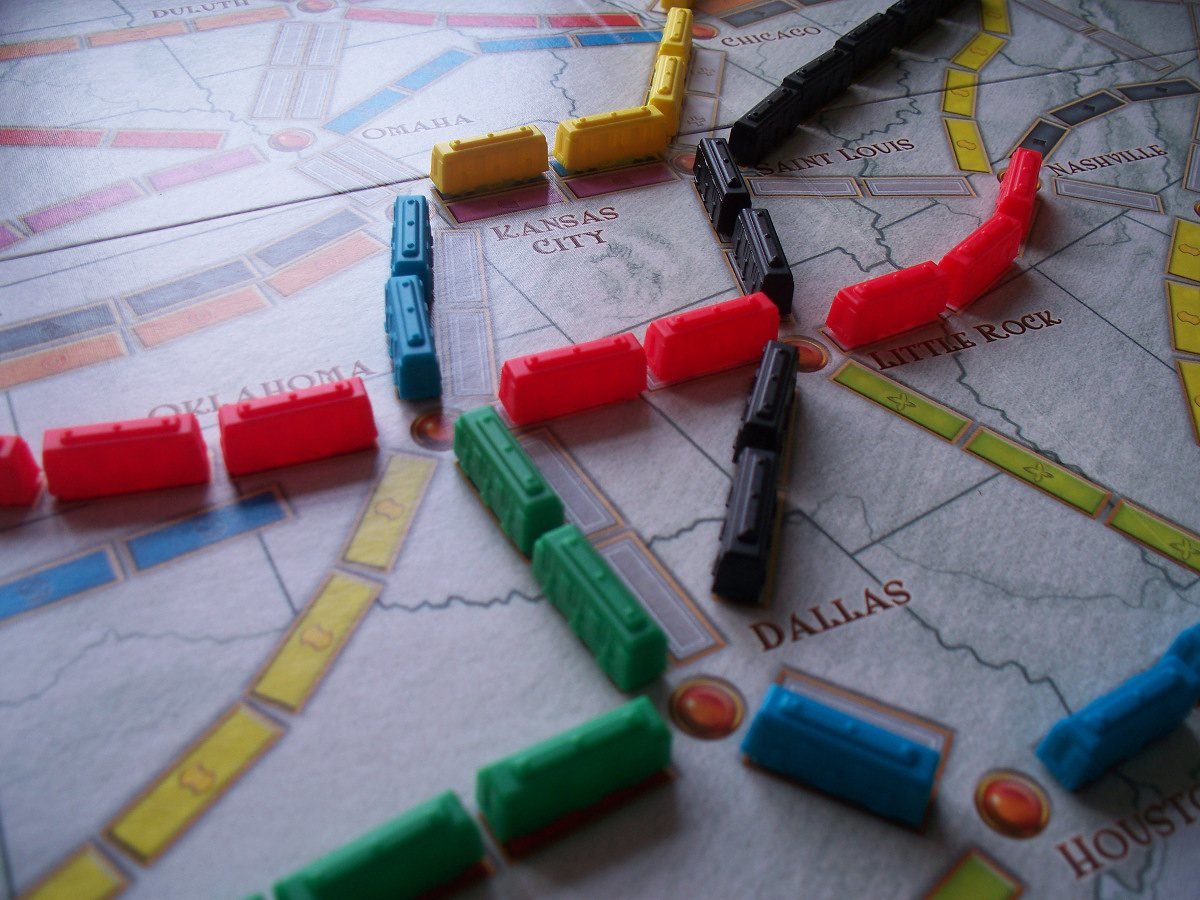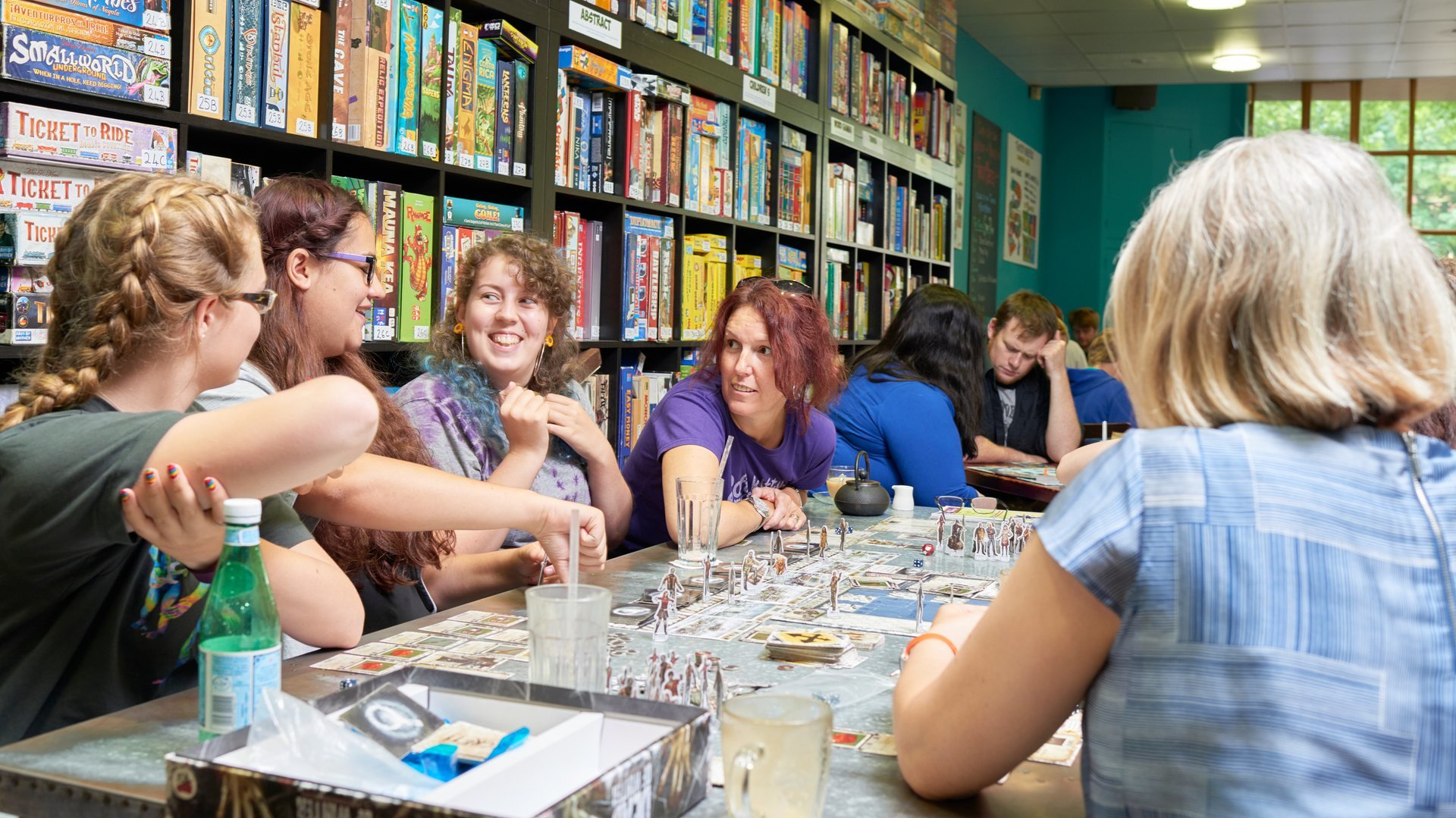Board games: ups and ... ups

A bright Thursday morning begins in Oxford, and the Thirsty Meeples Café on the market in Gloucestershire is a quiet buzz. We sit by the window at the table, warmed by the sun, and the manager of the place, Gareth, introduces himself and gives us a list of recommendations.
First, he offers the Forbidden Desert. And this is not a cocktail. “Your plane crashed in the desert, where you are looking for a lost civilization,” explains Gareth, wearing a T-shirt with the words “Game Guru.” "Suddenly, a storm is coming, and you need to find all the parts of the mythical flying ship to get away from it." Then he offers "Escape: The Curse of the Temple" [Escape: The Curse of the Temple], in which we take on the role of Indiana Jones, who escapes from an ancient and decaying tomb. "Or," says Gareth, "how about fighting the fire?" At the end, he recommends the Flash Point, in which my wife, and two sons, and I will save people from a burning building. You win if you pull out a lot of people. But if too many die, you lose. We choose the last game.
And while we are fighting a fire, a couple over 30 at the next table are competing to build railway tracks in the Netherlands. Somewhere else a young woman with two children plays for the foxes attacking the farm. A couple of the millennium generation make cardboard sushi on the samples shown on the maps. A lonely man from Bournemouth sits in front of a challenging playing field, defending London of 1920 from the invasion of Lovecraft monsters.
')

Withered Chips owners John and Zuzi.
Lunch has just begun, and the restaurant is almost full. "Chips" describe themselves as "the first and only cafe in Oxford with nastolki", and they are among the growing number of institutions that are appearing throughout Britain and inspired by the popularity of similar institutions in the United States. What brought these people here, from hardcore players to families? Evelyn, a scientist from the Netherlands playing a railroad game, Ticket to Ride with her Belgian husband, Roger, thinks he knows the answer. She looks at other visitors and the library of games on the shelves. "I would say that this is the original version of the social network."
Our world may be the world of Facebook, Pokémon Go, Netflix and iPads, but board games are flourishing. Even the explosion of the table of the 20th century, which has given us such unfading hits like Monopoly, Cluedo and Scrabble, cannot be compared with today. Market research firm NPD, which claims to have information on 70% of the toy trade in the UK, noted that sales of board games increased by 20% over the past year (including card games, dice games, war games with miniatures and role-playing games Dungeons & Dragons).
Ben Hogg, managing the advertising department at the British distributor Esdevium Games (importing, among other things, the game Ticket to Ride from the USA), estimates that the growth can actually reach 35%. According to him, in 2012 the full set of games "Train Ticket" (and for different countries there are different variations) sold in the UK in the amount of 16,000 pieces. In 2016, by the end of September, sales already amounted to 21,000 units. Starting working at Esdevium, Hogg noted that mostly buyers were interested in more “geeky” games, such as the fantasy Warhammer. Today, he says, “the audience is much wider. The level of interest is as high as ever. ”
Few are in a better position to observe this phenomenon than Peter Wooding. In the 70s, he played guitar in the punk band The Jerks (ranked in the top 100 in 1977 with the song “Get Your Woofing Dog Off Me”). In 1987, he opened the Orc's Nest game store in Covent Garden, London. He and the singer of the band Simon Ellis got hooked on the Dungeons & Dragons and the military nastolki. But there were few specialized retail stores, so they decided to open their own, in a small and half unqualified room. “There wasn’t even a floor there,” says Wooding. “It’s just littering.” They climbed the trash cans in search of medieval-style scenery, and scattered straw on the floor. Mostly they sold books on Dungeons & Dragons and historical war games, but the best were the lead miniatures for war games hanging from the boards that were used to decorate the walls of the room on the first floor.
“The first few years we were in poverty,” says Wooding (Ellis retired), in our conversation at the counter in Orc's Nest. He wears a straw hat, a piercing on his face and a well-groomed beard. He is a talkative man in his 50s, proud of his punk legacy. “We were checked by the tax authorities. And they asked: 'why are you doing this? You earn only 50 pounds a week! ” They thought we were laundering money, or something. ”


After nearly 30 years, the Orcish Nest logo with an orc stuck in the left nostril has not changed, but the straw on the floor and the old furnishings were replaced by polished aluminum and yellow-black rafters, with the result that the store looks like a space station from NF 80- x Clients and assortment, too, have changed.

Peter Wooding in his shop
“Five years ago, I noticed that the miniatures began to go worse,” says Wooding, “so I started placing board games in the window — he gestures at rows of colorful boxes with big names, Small World, Agricola, Carcassonne, Pandemic — and after this sale increased. " He noted the gradual extinction of “stereotypical gamblers” - woolen sweaters of single white men dressed in woolen sweaters.
“Now we have much more couples - young, professional. They still love to meet friends, but not to get drunk. They like to bring the game, drink a little, and have a good time at the table for 2-3 hours. ”
These more mainstream players, ordinary people, especially girls, in the past would certainly be very surprised to go to his shop. He points to the cover of the game “Pandemic” [Pandemic], a key product in the revival of the table, in which players need to fight together against epidemics of disease. On the cover is a woman scientist. “Much less discrimination, much more audience. More friendly games.
Catherine Howell, head of the gaming department of the V & A Museum of Childhood Museum in London, describes the Pandemic as a "conjuncture game." She chose it along with three other characteristic games - chess, monopoly and “ Game of the Goose ” at the exhibition “ Game Plan: re-opening board games ”. Howell considers himself a traditional player, whose childhood memories are associated with playing Scrabble and Cluedo with his family. She admits that five years ago, before the idea of the exhibition, she was not aware of the wave of new board games occupying the shelves in the Orc's Nest and the Shriveled Chips. In part, she attributes this wave to a “renaissance under the guidance of designers,” which began in Germany and then spread throughout Europe and North America. But she was surprised at how much the design of games progressed, which made the process of the game more restless and interesting than the same Monopoly.
The “European Games”, as they are called, are characterized by fairly calm topics (farming, landscape design, work on the dock), diminishing significance of chance, and, most importantly, by ensuring that the players do not drop out until the end of the game. The start of this wave is "The Settlers of Catan", and now simply "Catan" (we have known as "Colonialists"), created by German designer Klaus Tober. Since its publication in 1995, it has already sold 22 million copies in 30 languages. Players compete in the organization of settlements on the island and trade resources with other players, while the unfolding events keep players in the dive into the game until the very end. “This is very important,” says Howell, “because no one feels excluded. This is the most unpleasant thing in Monopoly - the one who first becomes bankrupt, waits in the corner until the rest play. ”
This theme is developed in the latest trend nastolk, cooperative games in which players win or lose the whole team, fighting with fire or saving the world from infection. “This leads to more serious social interactions,” says Howell.
“Pandemic” was invented by Matt Leacock, a 43-year-old from California, Matt Leacock, one of the most successful designers of nastol. He was inspired by the 2000 Lord of the Rings eurogame from Rainer Knizia. In it, players jointly act out for the hobbits of the Tolkien saga. “When I played it with friends, we were scared,” recalls Lycock. “There were self-sacrifices, ups and downs, and in the end everyone was satisfied, regardless of whether they won or lost. I wanted to know if I could do something like that. ”

Lykok's passion for the desk dates back to his childhood disappointments with games. “I loved to receive games as a gift most of all,” he says, “I was very happy, and then we opened the game, played it, and I was disappointed. Games have always seemed to me not good enough. ” With the help of his uncle, an enthusiast of games, young Lycock turned over the playing fields and tried to come up with something better using the available components.
Decades later, managing a team of designers in a startup related to communications, he came up with "Pandemic", just to check if he could make a game "where there would be many opportunities for dangerous non-linear growth" - that is, unexpected surprises and turns. At that time, pandemics were in the news, with epidemics of bird flu and SARS, "so it was all in my head."
“Pandemic” was a resounding success, and the latest version, “Pandemic Legacy: Season One” [Pandemic Legacy: Season One] represents another leap in game development. It was co-authored with the rising star of the nastol design, Rob Daviau, and in her, according to Lykok, “a very big story. It is like a computer character pumping game, where the rules and state of the world change. And forever. The story unfolds. We called it “First Season” because it has a story arch. Like you're watching the season of your favorite HBO series. ”
The growth of the video game industry, oddly enough, became the largest factor in the prosperity of innovative boards - because game consoles and mobile games normalized the game process.
“Video games and desktops are very much taken over from each other,” says Ben Hogg. - Everyone plays games on mobiles. Everyone on the smartphone has at least one favorite game. And now the number of people who do not refuse to play games is much more. "Also, you can often find electronic versions of a desktop, for example, Carcassonne, which runs well on tablets.
At the same time, crowdfunding has reduced the barrier for those who want to enter the nastol industry. Board games are able to collect more money on Kickstarter than their digital counterparts. Designers of the future, adapted from Dark Computers to the desktop, wanted to collect £ 50,000. They collected this amount in 3 minutes, and the entire campaign collected £ 3.8 million .
The Internet contributes to the improvement of the word of mouth, which the nastolk industry hopes for. Sites like BoardGameGeek collect YouTube review and video archives, such as " Shut Up & Sit Down " or " TableTop ", in which American actor Wil Wheaton is filmed, which arouses interest in games. There is a “TableTop effect” - if Wheaton talks about a game in a show, and he and other stars play and comment on decisions, then its sales increase dramatically. “The effect of the TableTop is huge,” says Peter Wooding. “If Wil talks about the game, it immediately ends on sale!”
Wheaton is almost obsessed with nastolkami. “The mission of TableTop is to share the joy of games with the world,” he says. - I think that we live in the times of a divided world, and if we survive after this fire in the garbage can, we will need to unite, and I hope to show by example that board games can be a journey of people together. They can teach us friendship and relationship building. So, when I hear about good sales of games, I am happy. This means that people who have not yet become players, or who are not so much a fan of games like me, go and buy them. Like Muggles Buying Hogwarts Tickets. "
In Withered Chips at Oxford, I talk with John and Zuzi Morgan. In 2012, they decided to start selling tickets to the Muggles, quit their jobs and tried to turn their love for the desk into a business.
They already had a large collection of games, and John heard about the Cafe in Toronto called Snakes and Lattes - in the menu which listed games, not dishes. This cafe inspired the spread of gaming cafes in North America. After a trial visit, the Morgans discovered "Withered Chips", and this idea paid off. “The trend goes up,” John answers the question about the business.
Zyuzi believes that the love of the desktops has grown so much that they were able to turn their hobby into a lifestyle. “There are so many technologies in life, everyone is busy, and I want to bring people together again, so that they don't just stare at the screens. It is natural for people. We must get together and communicate. ”

For a time, video games meant physical communication, either in arcades or in joint games on couches between friends and family members. And then the multiplayer moved to online, and the players were physically divided. In some gaming arenas, anonymity led to a poisonous atmosphere.
“Multiplayer games were interesting,” said Wheat Wheaton. - And then all sorts of assholes ruined everything. Everything turned into aggression and unpleasant behavior. I wonder if this did not lead to the fact that people who used to like to play them, began to look for other ways to have fun, so that you could see the person you are playing with. ”
Direct interaction is also important for Matt Lycock. “You are teaming up with people at the table,” he says. “This is very human.” And tactile. "You need to handle the physical components, you feel the texture of the cards and the wooden chips."
Games have always had a social component. Fernand Gobet, a professor of psychology at the University of Liverpool, co-author of “Turns in the head: the psychology of board games,” says board games are part of the culture in some countries. For example, mancala in Africa. They can be considered as a ritual of dedication. But in most countries, the nastolki offer the opportunity for families to play together. The point is to work together, not what is happening in the game. "
Viscous chips visitors agree with this. "Today it is very social," says Mark, a 35-year-old specialist in information models from Portsmouth.
Roger and Evelyn, who play “Train Ticket,” say they are in the process of moving to the Netherlands, because, according to Roger, they no longer can afford to live in Oxford. They often went to this cafe and could not leave without visiting it goodbye. “In our century, we seem to be beginning to fear our complexity,” he says. “We are looking for authentic things. Those that remind us of the simple times of childhood. " Nastolki - "innocence, returning to the world, which ...". He looks at me and smiles. “Who would have thought that David Bowie was the mysterious force that held us all together?”
For Roger, Evelina and Wil Wheaton, the desktops have already become something more than entertainment. “The game is not a mystery to be solved,” Wheaton believes, “but a story that needs to be told.” And in our online society, this is a story that needs to be shared - directly and through physical contact in the real world.
Source: https://habr.com/ru/post/369715/
All Articles